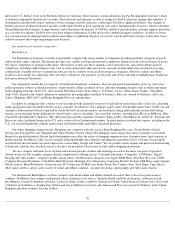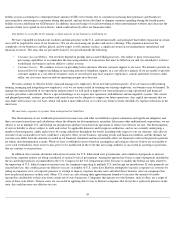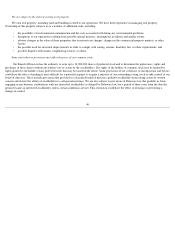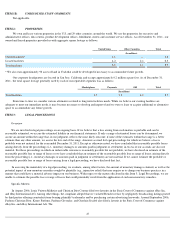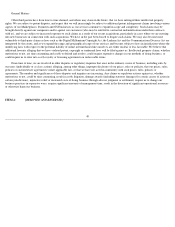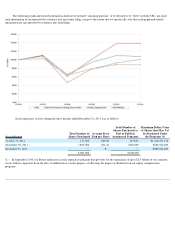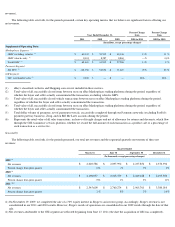eBay 2011 Annual Report Download - page 53
Download and view the complete annual report
Please find page 53 of the 2011 eBay annual report below. You can navigate through the pages in the report by either clicking on the pages listed below, or by using the keyword search tool below to find specific information within the annual report.
complaint alleged that we had interfered with the selective distribution network the plaintiffs established in France and the European Union by
allowing third parties to post listings offering genuine perfumes and cosmetics for sale on our websites. In June 2008, the Paris Court of
Commerce ruled that eBay and eBay International AG were liable for failing to prevent the sale of counterfeit items on its websites that traded on
plaintiffs' brand names and for interfering with the plaintiffs' selective distribution network. The court awarded plaintiffs approximately EUR 38.6
million in damages and issued an injunction (enforceable by daily fines of up to EUR 100,000) prohibiting all sales of perfumes and cosmetics
bearing the Dior, Guerlain, Givenchy and Kenzo brands over all worldwide eBay sites to the extent that they are accessible from France. We
appealed this decision, and in September 2010, the Paris Court of Appeal reduced the damages award to EUR 5.7 million and modified the
injunction. We have further appealed this decision to the French Supreme Court. In 2009, plaintiffs filed an action regarding our compliance with
the original injunction, and in November 2009, the court awarded the plaintiffs EUR 1.7 million (the equivalent of EUR 2,500 per day) and
indicated that as a large Internet company we should do a better job of enforcing the injunction. Parfums Christian Dior has filed another motion
relating to our compliance with the injunction. We have taken measures to comply with the injunction and have appealed these rulings, noting,
among other things, the modification of the initial injunction. However, these and similar suits may force us to modify our business practices,
which could lower our revenue, increase our costs, or make our websites less convenient to our customers. Any such results could materially harm
our business. Other brand owners have also filed suit against us or have threatened to do so in numerous different jurisdictions, seeking to hold us
liable for, among other things, alleged counterfeit items listed on our websites by third parties, “tester” and other not for resale consumer products
listed on our websites by third parties, alleged misuse of trademarks in listings, alleged violations of selective distribution channel laws, alleged
violations of parallel import laws, alleged non-compliance with consumer protection laws and in connection with paid search advertisements. We
have prevailed in some of these suits, lost in others, and many are in various stages of appeal. We continue to believe that we have meritorious
defenses to these suits and intend to defend ourselves vigorously.
In May 2009, the U.K. High Court of Justice ruled in the case filed by L'Oréal SA, Lancôme Parfums et Beauté & Cie, Laboratoire
Garnier & Cie and L'Oréal (UK) Ltd against eBay International AG, other eBay companies, and several eBay sellers (No. HC07CO1978) that
eBay was not jointly liable with the seller co-defendants as a joint tortfeasor, and indicated that it would certify to the European Court of Justice
(ECJ) questions of liability for the use of L'Oréal trademarks, hosting liability, and the scope of a possible injunction against intermediaries. On
July 12, 2011 the ECJ ruled on the questions certified by the U.K. High Court of Justice. It held that (a) brand names could be used by
marketplaces as keywords for paid search advertising without violating a trademark owner's rights if it were clear to consumers that the goods
reached via the key word link were not being offered by the trademark owner or its designees but instead by third parties, (b) that marketplaces
could invoke the limitation from liability provided by Article 14 of the ecommerce directive if they did not take such an active role with respect to
the listings in question that the limitation would not be available, but that even where the limitation was available, the marketplace could be liable
if it had awareness (through notice or its own investigation) of the illegality of the listings, (c) that a marketplace would be liable in a specific
jurisdiction only if the offers on the site at issue were targeting that jurisdiction, a question of fact, (d) that injunctions may be issued to a
marketplace in connection with infringing third party content, but that such injunctions must be proportionate and not block legitimate trade and
(e) that trademark rights can only be evoked by a rights owner as a result of a seller's commercial activity as opposed to private activity. The
matter will now return to the U.K. High Court of Justice for further action in light of the ECJ opinion. The case was originally filed in July 2007.
L'Oréal's complaint alleged that we were jointly liable for trademark infringement for the actions of the sellers who allegedly sold counterfeit
goods, parallel imports and testers (not for resale products). Additionally, L'Oréal claimed that eBay's use of L'Oréal brands on its website, in its
search engine and in sponsored links, and purchase of L'Oréal trademarks as keywords, constitute trademark infringement. The suit sought an
injunction preventing future infringement, full disclosure of the identity of all past and present sellers of infringing L'Oréal goods, and a
declaration that our Verified Rights Owner (VeRO) program as then operated was insufficient to prevent such infringement. The scope of a
possible injunction claimed is to be specified after the trial upon remand from the ECJ.
eBay's Korean subsidiary, IAC (which has merged into Gmarket and is now named eBay Korea), has notified its approximately 20 million
users of a January 2008 data breach involving personally identifiable information including name, address, resident registration number and some
transaction and refund data (but not including credit card information or real time banking information). Approximately 149,000 users have sued
IAC over this breach in several lawsuits in Korean courts and more may do so in the future. Trial for a group of four representative suits began in
August 2009 in the Seoul District Court, and trial for a group of 23 other suits began in September 2009 in the Seoul District Court. There is some
precedent in Korea for a court to grant “consolation money”
for data breaches without a specific finding of harm from the breach. Such precedents
have involved payments of up to approximately $200 per user. In January 2010, the Seoul District Court ruled that IAC had met its obligations
with respect to defending the site from intrusion and, accordingly, had no liability for the breach. This ruling has been appealed by approximately
34,000 plaintiffs to the Seoul High Court, where it is currently being heard de novo. A decision is expected in 2012.
48


